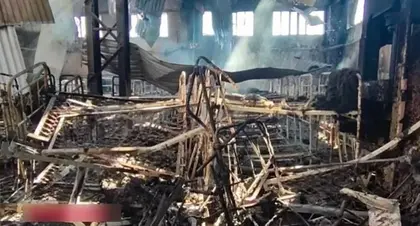Ukraine called on the United Nations and the International Committee of the Red Cross (ICRC) to investigate a deadly attack on a prison in occupied eastern Ukraine last year on Monday, July 29.
The attack, which occurred two years ago on July 29 at the Olenivka facility in the eastern Donetsk region, resulted in the deaths of at least 50 Ukrainian prisoners of war (POW) and injured around 130, according to Kyiv.
JOIN US ON TELEGRAM
Follow our coverage of the war on the @Kyivpost_official.
When the blast happened, the Olenivka colony was holding thousands of Ukrainian POWs, including members of the Azov battalion, who defended the Azovstal steel works in Ukraine’s port city of Mariupol before surrendering to Russian forces.
Ukrainian rights ombudsman Dmytro Lubinets urged the UN and ICRC to investigate, stating, “Two years ago, Russians carried out a terrorist attack in Olenivka against Ukrainian POWs. I call on the UN and the ICRC to fulfill their mandate and investigate this war crime.”
The Ukrainian foreign ministry reported that Russian officials had obstructed independent investigators from accessing the site.
President Volodymyr Zelensky said, “Russia must be held accountable for this. And it will be. There is no scenario in which the murderers will remain unpunished.”
The attack has been a point of contention, with both sides accusing each other. The Russian embassy in London faced criticism for a social media post that referred to the Ukrainian soldiers at Olenivka as deserving a “humiliating death.”

Kyiv Says Russia Shot Dead Five Surrendered Soldiers
In a report published last October, investigators with the UN Rights Monitoring Mission in Ukraine said they were continuing to investigate the explosions, stressing that more information was needed to establish the precise circumstances and clearly attribute responsibility.
However, they said, it was clear that “the explosions were not caused by HIMARS rockets launched by Ukrainian armed forces.”
The UN human rights agency’s mission, which has been present in Ukraine since 2014, has not had access to the penal colony but said it had reached its conclusions following interviews with more than 50 witnesses and survivors, as well as analysis of video and photographic footage.
You can also highlight the text and press Ctrl + Enter






